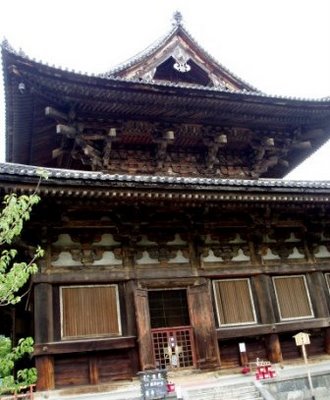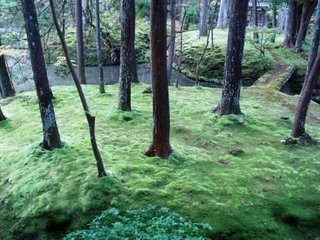Words are marvelous because they can work as a useful tool to explore possibilities to share with others with different views from yours.
11/05/2006
Against Russia
10/18/2006
What is a Faulknerian?
8/15/2006
To the World
Japan seems to have been charged with its alleged attempts to whitewash the atrocities it committed during the wars in the first half of the 20th century. Some have found three symptoms of its kind in 1) some of the descriptions in the Japanese history textbooks, 2) the Japanese insistence on its own dominion over Takeshima (alleged by Korea), and 3) the present Japanese Prime Minister’s frequent visits to Yasukuni Shrine. However, I wonder how these can be regarded as the symptoms because I observe they are just indicative of Japan’s repentance and responsibility for what it did in the wars, and its results. In another expression, Japan has a firm determination not to appeal to arms to resolve international conflicts with any other countries. So, I don’t understand how those interpretations can go so far. Let me try to rectify the misunderstandings.
1) As to the Descriptions in textbooks
Again, one of the biggest lessons the wars gave Japan was you should not appeal to arms to handle international affairs because a war is just a competition in arm, so it cannot work as a way to judge what is right over a matter in question. This must have been an axiom to Japan, but our (great-) grandfathers were driven to the wars. Why? Japan thinks it necessary to study more about the international wars in the first half of the previous century, to trace how he forced himself to participate in the wars, the Shino-Japanese war and the Pacific War, whose whole picture, according to researchers, has remained incomplete. Some attribute its decisive cause to the Japanese being extremely evil. But Japan thinks it is just a layman’s answer. A factual survey of Japan’s actions during the wars shows he did so many things, some of which should be categorized as bitter wrongdoings and others should not. Some persons think the latter actions should not be described in the textbooks, but Japan wants to get a whole picture of the wars to trace the true cause(s) of the biggest tragedy that the world had ever had, so those descriptions need to be in the textbooks, in order to let the students see the wars in perspective.
2) Takeshima (Dokto)
Which country has the authorized dominion over Takeshima (Dokto)? This has been difficult to settle because there has been no clear logic in showing who the true owner of the island has been. In the beginning, what can give the authority to either of them? Is it factual records or documents? They cannot because they are just pieces of information, so they cannot give an unerring answer to the problem, so that each of the two countries is allowed to cling to his own assertion while ignoring the opponent’s statement. What should they do then? One of the most possible solutions might be to ask the International Court of Justice for help. Japan suggested doing so, but Korea has refused to agree. I don’t know why.
What I want to let Korea know most is that Korea is doing the same thing as Japan did against Korea before. Korea has put its army in Takeshima to prevent any Japanese civilian fishermen from approaching to the island. In short, Korea has appealed to arms to handle international affairs. I suggest Korea should leave the Takeshima matter to the International Court of Justice. Let me tell you Japan is not going to handle this matter with weapon.
3) Yasukuni Shrine
I would say this is a matter of intercultural conflict. So, I think Japan needs to describe and delineate how Shinto, a Japanese idiosyncratic religion, lets Japanese pay homage at the shrine. Those who have criticized the Japanese Prime Minister’s frequent visits to Yasukuni Shrine, I’m saying, do not know what the visits mean. Do you know Shinto has no doctrine to cling to and its reason? There are so many religions in the world, but they look the same in that they may help us understand or accept a fact complicated, unfathomable, and susceptible to several readings, like why we are mortal, why my baby was gone at his or her birth, why I have had no leg since I was born, why a person whom I thought honest and sincere kills another person, etc. You can say that the kind of fact should be a phenomenon in which two or more opposite interpretations can go. On the contrary, the religions are different from each other in their ways to help or let persons understand or accept those facts. I’m saying some who criticize the visits are ignorant of the way adopted in Shinto.
An event becomes a problem to you when the event collides with the one you have had. Can you guess what Shinto requires you to do then? It advises you to let those incompatible things coexist peacefully and tranquilly. In Shinto, “praying” is correspondent in meaning with not “admiring or worshipping someone” but “contemplating the kind of situation in which there are two or more things that are inconsistent with each other.” More important, the wars were an amalgam of so many phases: Japan competed with and was lost to US in the Pacific War while Japan invaded China in the Shino-Japan War like the Powers did in the world then, and the Japanese leaders committed awful mistakes in adopting strategies and made so many Japanese soldiers die in vain though they did not intend (they were not wise enough). To Japanese, those were mingled indistinctively in the wars. You should not see just one element, or you would not be able to see the wars in wider perspective. I would say that the Japanese Prime Minister praying at Yasukuni Shrine indicates an attempt to let the whole disastrous wars remain in the Japanese minds, including Japan’s remorsefulness over having made so many mistakes and their results, distress and anguish, and his grief and lamentation for those who were forced to live and survive in the Dark Age.
NY Times(August 14, 1945)
Townhall (August 20, 2006)
7/27/2006
Chi
Did you hear about CHI, seen in Dragon Ball Z, a Japanese animation? It is something mysterious, a kind of supernatural power. I didn't believe its existence until I found myself emitting it.
A couple of months ago, I found my feet paralyzed when I was getting into computer, so I thought I should have got a serious problem in my brain or backbone. Additionally, I realized I was losing weight, no less than 5 kilos. I said to myself, "It may be a cancer somewhere in my body."
I tried not to depress myself with that guess because a couple of decades in my life told me my feelings would affect my sickness. I told myself to be positive and relaxed to take away any bad disease from me.
Then I realized my hands were wrapped in something warm and it was so abundant that I thought I could throw it away. I threw it to my sister, she said something was felt in or on her forehead.
I had seen a middle-aged woman, one of my colleagues, using chi to heal middle-aged persons. Then, I thought she was trying to deceive us, though I heard one of them say, "my pain in my head has gone." Anyway, I recalled how she used chi and began to use it.
I have used it for about 80 persons; some are fine and others have headache and stiff shoulders; more than 90 percent of the persons felt something emitted through my hand. 95 percent of the persons with either headache or stiff shoulders said the diseases were gone.
I want to know what is emitted through my hand or what has been called chi. Let me know if you know.
4/21/2006
Moss Temple
Well, if you visit Saiho-ji, you're required to reserve a couple of months before visiting Saiho-ji. And there you're permitted to see the sights in the garden after making a handwritten copy of one passage in a Buddhistic scripture to give you calmness because it is thought concentrating into writing in a ritual or formal way would offer you a feeling of calmness and detachment.
I would recommend you to come to Saiho-ji in November because you will be able to enjoy the contrast of Moss Green with Red Leaves. When I was there, I found I had not seen such a beautiful place. I was driven to keep taking photos of the sights, but I also found my photo skill was not enough and I thought I would buy another camera better in quality enough to enable me to take better ones. Next time I go there, I will take a new camera with me.
3/29/2006
Beautiful Foolishness of Things
Can you guess what it means? Anyway, that remark reminded me of the conversation between Smith and Neo in the culminating part of The Matrix: Revolution. Smith saw Neo being beaten but trying to fight, and said, "Why, Mr.Anderson? Why, why, why? Why do you do it? Why, why get up? Why keep fighting? Do you believe you're fighting for something? For more than your survival?"
You may more easily understand the meaning of Okakura's remark if you replace "fighting" with "surviving." This is one of the most difficult questions human beings have ever had. Smith continues to ask,
Can you tell me what it is? Do you even know? Is it freedom or truth? Perhaps peace? Could it be for love? Illusions, Mr. Anderson. Vagaries of perception. Temporary constructs of a feeble human intellect trying desperately to jusitify an existence that is without meaning or purpose! And all of them as artificial as the Matrix itself although only a human mind could invent something as insipid as love. You must be able to see it, Mr. Anderson. You must know it by now. You can't win. It's pointess to keep fighting. Why Mr. Anderson? Why do you persist?
I agree with Smith choosing the word "persist" because I don't know why I try to survive. What answer can you give Smith and me? Few persons know exactly where they are in a etaphysical sense, but some of you can persist in stating "Because I choose to (survive)" like Neo answers there.
Well, what do you think many of you would do in this kind of uncertainty? I think many of them have to try to find what is secure in this world on which to establiish their own lives, so what matters most to them should be whether they can be satisfied or not.
They are mortal and temporal, so you will be nothing as things will be, but so long as you live you want to do something that will satisfy you. In this sense, you are foolish, but don't you think they may look beautiful in cherishing their tiny limited lives? At least, some Japanese think so. This philosophy lies behind Japanese culture, according to Okakura Tenshin.
In Faulknerian expression, "between nothing and grief, I will take grief."
2/28/2006
Siva's View 4: Buddhism

Buddhism has been regarded as one of the major religions in Japan, but I don't think it has played the same roles as Christianity in the West and Islamism in the Middle East.
It was thought to flow into Japan through Korea in the midst of the 6th century, but it didn't have a definite form or doctrine to cling to, so the people were just attracted by magnificence of Buddhistic statues, which made them believe it had a supernatural power to ask for help.
More important, such splendidness, as you might call ostensiveness, was utilized to unite the small communities into Japan in the 7th century. Therefore, so many huge temples and statues were built in the Nara and Heian periods (710-about 1200).
One of the big examples is in the photo. The building is named "Daikodo" in "Todai-ji" in Kyoto. Can you see the small door in the big door? The small one is for persons. The big one is for the 12 huge statues who live inside. I hope you will have a chance to appreciate each of them.
Go to What is Buddhahood?
1/27/2006
Siva's View 3: the Birth of Japan
Before that, the island that would be Japan was like the USA in the first half of the seventeenth century. I mean the immigrants came there from different countries and regions, including South Asia and Polynesia. Of course, before they came there, some peoples must have been there, like Eskimos.
From the 4th or 5th century, a powerful people from the Korean peninsula moved to Japan, who tried to survive on tree in Japan because they need them to make iron. Some researchers say that they were so aggressive that they were described as a big snake with eight heads in a myth. Anyway, those Koreans were one of the major peoples in ancient Japan.
As to the dawn of Japan, one of the biggest mysteries was why so many small communities in ancient Japan were integrated into one country without any conflicts. As shown above, there were several peoples, each of them had a community, so it seemed to be difficult for them to have a whole country without any competition, but they did it peacefully.
They needed to be united into a country in the beginning of the 7th century because they were afraid China would assault Ancient Japan consisting of small communities. In fact, China and Kogryo attacked Paekche in the south of the Korean peninsula, and Japan went to help Paekche, but lost the war. Their threat required small communities in Japan to be a whole country.


